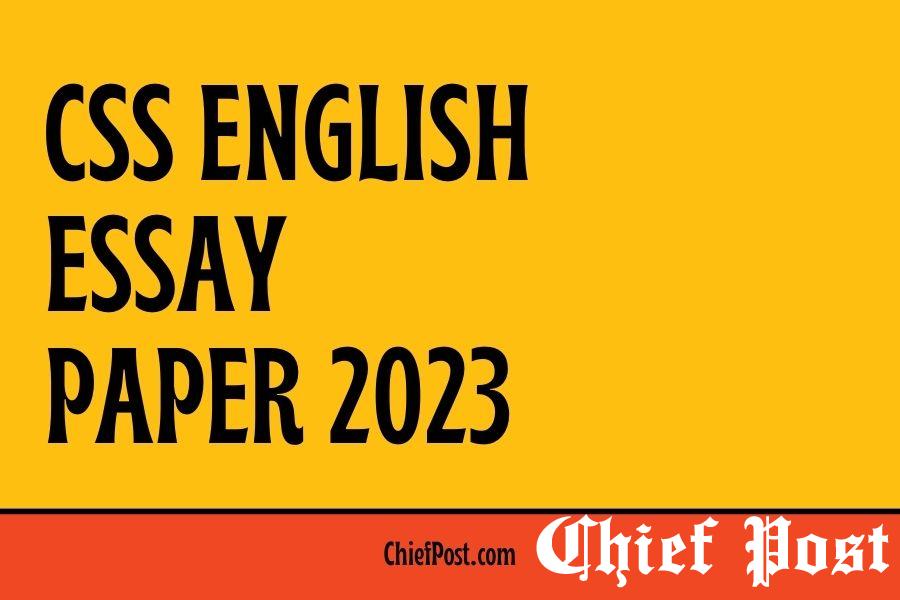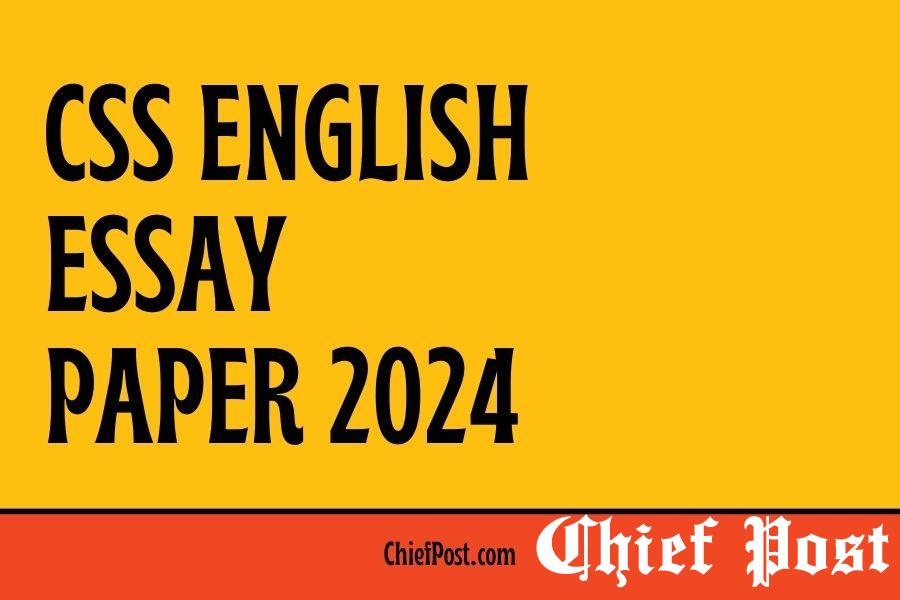
English Précis and composition 2023 — CSS Past Paper
FEDERAL PUBLIC SERVICE COMMISSION
COMPETITIVE EXAMINATION – 2023 FOR RECRUITMENT TO POSTS IN BS-17 UNDER THE FEDERAL GOVERNMENT
ENGLISH (PRECIS & COMPOSITION)
TIME ALLOWED: THREE HOURS
PART-I(MCQS): MAXIMUM 30 MINUTES
PART-I (MCQS) MAXIMUM MARKS = 20
PART-II MAXIMUM MARKS = 80
NOTE:
- (i) Part-II is to be attempted on the separate Answer Book.
- (ii) Attempt ALL questions from PART-II.
- (iii) All the parts (if any) of each Question must be attempted at one place instead of at different places.
- (iv) Write Q. No. in the Answer Book in accordance with Q. No. in the Q.Paper.
- (v) No Page/Space be left blank between the answers. All the blank pages of Answer Book must be crossed.
- (vi) Extra attempt of any question or any part of the question will not be considered.
PART-II
English P & C – CSS 2023
Q. 2. Write a precis of the following and suggest a suitable title:
On the question of freedom in education there are at present three main schools of thought, deriving partly from
differences as to ends and partly from differences in psychological theory. There are those who say that children should
be completely free, however bad they may be; there are those who say they should be completely subject to authority,
however good they may be; and there are those who say they should be free, but in spite of freedom they should be
always good. This last party is larger than it has any logical right to be; children, like adults, will not all be virtuous if
they are all free. The belief that liberty will ensure moral perfection is a relic of Rousseauism, and would not survive a
study of animals and babies. Those who hold this belief think that education should have no positive purpose, but
should merely offer an environment suitable for spontaneous development. I cannot agree with this school, which
seems to me too individualistic, and unduly indifferent to the importance of knowledge. We live in communities which
require co-operation, and it would be utopian to expect all the necessary co-operation to result from spontaneous
impulse. The existence of a large population on a limited area is only possible owing to science and technique;
education must, therefore, hand on the necessary minimum of these. The educators who allow most freedom are men
whose success depends upon a degree of benevolence, self-control, and trained intelligence which can hardly be
generated where every impulse is left unchecked; their merits, therefore, are not likely to be perpetuated if their
methods are undiluted. Education, viewed from a social standpoint, must be something more positive than a mere
opportunity for growth. It must, of course, provide this, but it must also provide a mental and moral equipment which
children cannot acquire entirely for themselves.
Q. 3. Read the following passage carefully and answer the questions given at the end. (20)
The majority of people have always lived simply, and most of humanity still struggles on a
daily basis to eke out a meager existence under dire circumstances. Only in affluent industrialized countries do people
have the luxury of more goods and services than they need to survive. On the basis of material wealth, North Americans
and Europeans should be the happiest people on earth, but according to the 2012 Happy Planet Index (HPI), they are
not. Surprisingly, what had begun as an experimental lifestyle evolved into a quiet revolution that spread the word
through books such as Duane Elgin’s best-selling Voluntary Simplicity: Toward a Way of Life that is Outwardly Simple,
Inwardly Rich (1981), as well as numerous magazines, alternative communities of the like-minded, and, later, Internet
websites. Combined with a growing awareness of the environmental consequences of consumerism, the voluntary
simplicity movement sought to reduce the consumption of goods and energy and to minimize one’s personal impact on
the environment. “Voluntary” denotes a free and conscious choice to make appropriate changes that will enrich life in a
deeper, spiritual sense. “Simplicity” refers to the lack of clutter, that is, eliminating all those things, patterns, habits, and
ideas that take control of our lives and distract us from our inner selves. However, this is not to be confused with
poverty, which is involuntary, degrading, and debilitating. Neither does it mean that people must live on a farm
or reject progress or technology, or do without what is necessary for their comfort and welfare. To practice voluntary
simplicity, one must differentiate between what one wants (psychological desires) and what one needs (basic
requirements of life), and seek a healthy balance that is compatible with both. In a consumer society where advertising
bombards us with the message that without this, that, and the other product, we are unsuccessful, undesirable, and
unimportant, being clear on what you really need and resisting what you don’t can be an ongoing struggle. The beauty
of voluntary simplicity is that it is a philosophy, and not a dogma. How one goes about it depends on individual
character, cultural background, and climate. For this, three Rs (i.e., Reduce, Recycle & Reuse) represent the best way to
get a handle on rampant consumerism. In economies driven by the quest for ever more, living with less
is erroneously equated with poverty and social inferiority. By conserving energy, for instance, you are actually ensuring
that more resources are available for future use. By making a frugal budget and sticking to it, you can eliminate
unnecessary expenses. Recycling paper, metal, plastic, and glass and reusing building materials and old clothing keep
materials in the loop and out of landfills. Pooling skills and resources through barter networks not only saves money,
but sharing with others establishes bonds and fosters a sense of community. With the glut of cheap goods that are
usually designed for obsolescence, quality products that last are becoming progressively harder to find. In the long run,
a more expensive but durable and repairable item or even an older used item that is still in good condition is a better
investment than a brand new piece of junk that will only break down and end up in the trash. Thus, at the heart of
voluntary simplicity is the conscious realization that less is really more. Less consumption means more resources for
future generations. Less activity that brings little satisfaction or reward is more time for yourself and your loved ones.
Less stuff is more space to move around in. Less stress means more relaxation and better health. Less worry provides
more enjoyment and more fulfillment in life.
Questions: (4 marks each)
- How important is happiness to most people, and what is the relationship between material wealth and
happiness? - How does the author characterize the concept of ‘Voluntary Simplicity’ as a movement and as a
philosophy? - What impact is feared by the growing consumerism of modern society?
- What influences make it difficult for people to reduce their consumption patterns?
- What are the challenges and rewards of voluntary simplicity?
Q. 4.
orrect only FIVE of the following: (10)
(i) His knowledge of languages and international relations aid him in his work.
(ii) The ambassador, with his family and staff, invite you to a reception at the embassy on Tuesday
afternoon.
(iii) This year, he will sit in the CSS examination.
(iv) The Chief Executive will let us know whether or not he can attend the meeting.
(v) When he came back from vacation, Aslam and me plan to look for another apartment.
(vi) If some of you make a noise, they shall be punished.
(vii) He came to me to enquire what is the salary attached to the appointment.
(viii) I am too tired that I do not hunt words and idioms in my English book.
Q. 5. (a) Punctuate the following text, where necessary. (05)
while taking a nap on the porch one hot summer day hodga dreamed that a stranger promised to
give him ten pieces of gold the stranger placed them in hodgas hand one by one until he reached the tenth
piece which he hesitated to give him come on what are you waiting for said hodga you promised me ten
just then he woke up he immediately looked at his hand and saw that it was empty he quickly shut his eyes
again stretched out his hand and said all right i ll settle for nine.
(b) Re-write the following sentences (ONLY FIVE) after filling in the blanks with appropriate
Prepositions. (05)
(i) The neighbours came _ my house to see what’s going on in the house. (ii) She sat _ the shade of the tree.
(iii) The moon does not shine its own light.
(iv) The burglar jumped the compound wall.
(v) She entered an agreement with them.
(vi) I have been working hard arithmetic.
(vii) He got his bicycle.
(viii) It cannot be done __ offence.
Q. 6. Use only FIVE pairs of words in sentences clearly illustrating their meanings. (10)
(i) Antic, Antique (ii) Draught, Drought
(iii) Quaint, Queer (iv) Momentary, Momentous
(v) Compliment, Complement (vi) Eminent, Imminent
(vii) Faint, Feint (viii) Immigrant, Emigrant
Q. 7. Translate the following into English by keeping in view figurative/idiomatic expressions. (10)
ﺑﺰرگ ﻧے ﺑﺘﺎﯾﺎ کہﺟﻨگﻞ کے پﺎر اﯾک پہﺎڑ ہے ﺟہﺎں وه پﮭﻮل اُگﺘﺎ ہے ﺟﺲ کی ﺧﻮﺷﺒﻮ ﺳے
آﻧکﮭﻮں کی کﮭﻮﺋی ہﻮﺋی روﺷﻨی ﻟﻮٹ آﺗی ہے،ﻣگﺮ پہﺎڑ ﺑہﺖ ﺑﻠﻨﺪ ہے اور اس پﺮ ﺑے ﺷﻤﺎر
چﮣﺎﻧﯿںہﯿں،کﺎﻧﮣے دار ﺟﮭﺎڑﯾﺎںہﯿںاور ﺑڑے ﺑڑے پﺘﮭﺮہﯿں ﺟﻮ راﺳﺘہ روک ﻟﯿﺘےہﯿں۔ اِس پہﺎڑ
پﺮ ﺟﺎﻧے کے ﻟﯿے کﺌیﻟﻮگ آﺋے اور چﻠےگﺌے ﻣگﺮ اﯾﺴﺎ کﻮ ﺋی ﺷﺨﺺ ﻧہﯿں آﯾﺎ ﺟﻮ پﮭﻮل ﺗک
پہﻨچﺎ ہﻮ۔ ﺷﺎﯾﺪ اِﺳی ﻟﯿے دُﻧﯿﺎ ﻣﯿں دُکﮭ اور ﺗکﻠﯿﻒ ہے اور اﻧﺴﺎن روﺷﻨی کی ﺗﻼش ﻣﯿں ہے۔
**************










